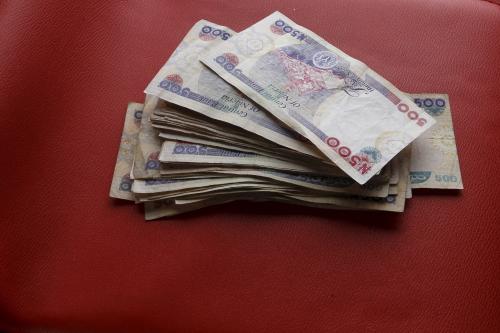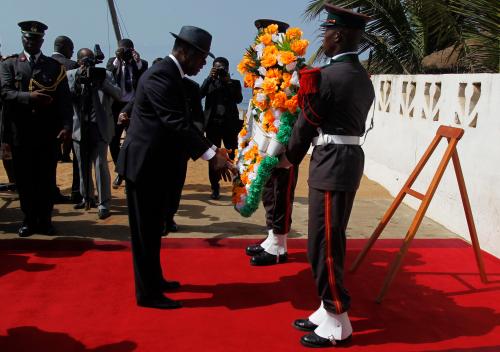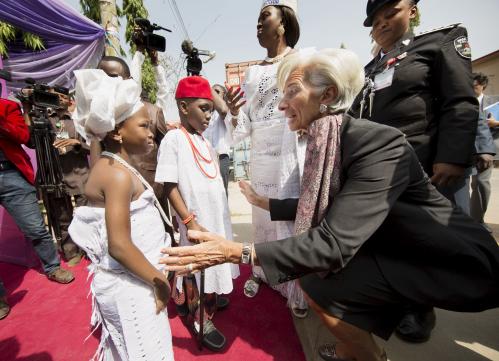Nigerian officials attempt to close budget gap with bonds
Nigerian authorities are currently exploring a broad array of financing options to help fill the government’s sizable $11 billion budget deficit. On Tuesday, June 7, a delegation of senior Nigerian officials led by Minister of Finance Kemi Adeosun traveled to London to meet with roughly 65 investors and present the government’s plans to fund its budget, including through nearly $3 billion in loans from the World Bank and African Development Bank, dollar and Chinese-currency denominated debt, and $1 billion in potential eurobond offerings, which could be issued as soon as Q3 (July-September 2016). While many investors responded positively to the government’s presentation—especially its plans to diversify the economy away from oil revenues and make government spending more efficient—still, they were apprehensive about a eurobond issuance, stating that unless Nigeria takes concrete steps toward implementing a more flexible exchange rate policy (a move announced by Nigerian Central Bank Governor Godwin Emefiele two weeks ago) attracting capital will continue to be a challenge, the Financial Times reports. According to Bloomberg, when asked when the new, flexible exchange rate regime would be launched, Nigerian officials replied that it would be a matter of “days or weeks” as the government is “having discussions, including with local banks.”
Since its last issuance of dollar-denominated debt in 2013, when it raised $1 billion in five- and 10-year debt, foreign investment has declined markedly due in large part to capital controls. Meanwhile, airlines including Iberia and United Airlines have recently pulled out of Nigeria due to depleted foreign exchange reserves, dollar shortages, and a growing inability to repatriate profits from the country—and other international carriers seem likely to follow.
Isabel dos Santos is named chairwoman of Angola’s state-owned oil company
Last week, Angolan President Jose Eduardo dos Santos appointed his daughter Isabel chairwoman of Angola’s state-owned oil company Sonangol. In a presidential decree, President dos Santos announced the dismissal of the entire managing board and its replacement by new executives. With falling oil revenue attributed to low commodity prices, Angola—now Africa’s largest oil producer after numerous attacks in the Niger Delta took a serious toll on Nigeria’s oil output—announced the restructuring of the company in the aim to “increase efficiency and profitability.” While opposition parties see the move as President dos Santos’ attempt to secure political grip, Isabel, Africa’s richest women with a current net worth of 3.4 billion, denies having political ambitions.
The decision to appoint Isabel dos Santos the head of Sonangol was highly criticized by Angolan politicians and lawmakers. The main opposition party accused the president of perpetrating nepotism and rejected the appointment. Earlier this week, a group of Angolan lawyers decided to file a petition with the attorney general’s office denouncing the president’s violation of public probity laws. The president’s son, Jose Filomeno dos Santos, currently manages Angola’s $5 billion sovereign wealth fund. The group’s spokesperson denounced the unacceptability of “one son [running] the sovereign wealth fund and another [managing] the company that feeds it.”
In related news, Monday, after studying the difference between the funds received and those invested, a report by local Angola news source Valor Economico reported the existence of a $50 billion discrepancy in Sonangol’s accounts. Isabel declined a comment request on the topic, and on Tuesday, the oil company denied the existence of said gap.
ECOWAS summit highlights trade, security, and integration as top issues
On Saturday, June 4, leaders of the countries of Economic Community of West African States (ECOWAS) met in Dakar, Senegal for their 49th heads-of-state summit. ECOWAS is composed of Benin, Burkina Faso, Cape Verde, Côte d’Ivoire, the Gambia, Ghana, Guinea, Guinea Bissau, Liberia, Mali, Niger, Nigeria, Sierra Leone, Senegal, and Togo. During the meeting, President Ellen Johnson Sirleaf of Liberia was elected the new chairperson of the regional organization, succeeding Senegal’s President Macky Sall. This is the first time a woman has held the position.
Several important topics were on the agenda, but closer security cooperation was foremost. Though a decision was not officially made, the leaders discussed the creation of a West African regional security force, a conversation provoked by the growing number of terrorist attacks around the region. Concern over the precarious political and human rights situation in the Gambia also prompted the leaders to announce an observation mission to the country before its elections in December.
Also on the agenda was an enhanced effort for regional integration, which offers the benefits of increased trade and movement of people, among others. These efforts face major obstacles, however, especially in the form of political will, said Director of Trade at the ECOWAS Commission Dr. Gbenga Obideyi on June 7. He stated, “When a president of a country signs an agreement, he represents the highest authority of the land but when it comes to implementation then there is some reluctance.” In addition, as there are no sanctions for failing to enact regional policies, ECOWAS members often lag behind in establishing them. Also discussed were the negotiations between ECOWAS and the European Union over an Economic Partnership Agreement, with Nigeria’s Vice President Yemi Osinbajo expressing concerns over manufacturing, and noting country’s reluctance to sign an agreement at this time.
The final communique of the summit can be found here.
Note: This post previously stated that discussions over $3 billion in loans was with the International Monetary Fund. The discussions were actually with the World Bank. The text was corrected on June 13, 2016.





Commentary
Africa in the news: Nigeria meets bond investors, Angolan president appoints daughter state oil firm’s chair, and ECOWAS summit focuses on regional priorities
June 10, 2016